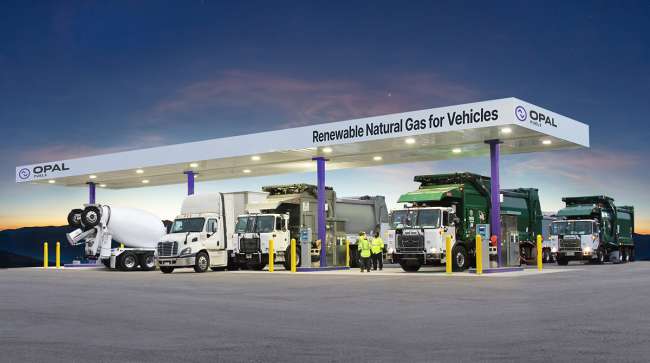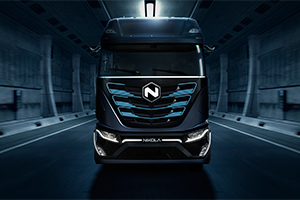Senior Reporter
Nikola, Opal Fuels to Build Hydrogen Fueling Stations

[Stay on top of transportation news: Get TTNews in your inbox.]
Truck maker Nikola Corp. and Opal Fuels, a producer and distributor of renewable natural gas for heavy-duty truck fleets, announced their intent to co-develop and co-market hydrogen fueling infrastructure for trucking, beginning with on-site locations for private fleets.
Nikola and Opal Fuels said they will also identify and evaluate opportunities to establish public access hydrogen stations.
Nikola’s Tre fuel cell electric vehicles for the North American market are slated for a 2023 launch from its Coolidge, Ariz., manufacturing facility, according to the Phoenix-based company.
Under the memorandum of understanding, renewable natural gas is slated to be used in hydrogen production. The collaboration will combine Nikola’s proposed fuel-cell electric-vehicle bundled lease offer — which will include Nikola’s FCEVs, vehicle service and maintenance and hydrogen fuel supply — with Opal Fuels’ experience in developing, constructing, and operating heavy-duty truck fueling stations to deliver a complete end-to-end solution, according to a release.
“Our primary focus has been renewable natural gas production and development and then finding the highest, best value of that RNG. And that’s in the U.S. transportation fuels market, both from an economic perspective and a sustainability perspective,” Adam Comora, co-CEO of Opal Fuels, told Transport Topics.
The Environmental Protection Agency noted hydrogen, to be produced, must be separated from the other elements in the molecules where it occurs — and there are many different sources of hydrogen and ways for producing it for use as a fuel. EPA said the two most common methods for producing hydrogen are steam-methane reforming and electrolysis.
Comora said RNG can be used in either process to help produce a lower-carbon hydrogen that could be delivered to fueling stations either in a liquefied form or in a high pressure gaseous form.
“We think hydrogen will be a terrific end market for RNG and we think we will be a leader in delivering that low-carbon hydrogen to Class 8 fleets,” he said. “That’s why we are excited about working with Nikola and finding ways to create that fueling infrastructure in a cost-effective reliable manner for fleets, and using RNG in the production of that hydrogen.”
The companies noted they intend to also develop best practices and standards for hydrogen refueling station design and protocols allowing for a safer, more reliable, scalable and low total cost of ownership for the transportation market.
Comora declined to discuss financial details of the agreement. He added, “We do believe we will be building some stations in 2022 with Nikola. Once we begin building those stations, that’s when you’ll hear more about the locations on those stations.”

Comora
“This alliance with Opal Fuels provides excellent potential synergies given their experience building and operating fueling stations,” said Pablo Koziner, president of energy and commercial operations at Nikola.
Opal Fuels has constructed about 350 RNG fueling station projects, and has more than 15 years of successful relationships with trucking fleets across the continent, reducing the carbon intensity of their fuel, the White Plains, N.Y.-based company said.
RNG — used as a fuel in Class 8 trucks now — is, EPA said, a term used to describe biogas that has been upgraded for use in place of fossil natural gas. The biogas used to produce RNG comes from a variety of sources, including municipal solid waste landfills, digesters at wastewater treatment plants, livestock farms, food production facilities and organic waste management operations.
In related news, Nikola in September was forced to slash the delivery projection for its debut battery electric big rigs in half to no more than 50 vehicles because of persistent supply chain issues, Bloomberg News reported.
Comora said Opal Fuels has avoided similar supply chain issues. “We have not had any significant supply chain issues, either with building new RNG production facilities or constructing new fueling stations.”
Read more here: https://t.co/pFBE04HdC5 pic.twitter.com/S91VVpEZ00 — Nikola Motor Company (@nikolamotor) September 30, 2021
Meanwhile, Nikola announced in August the U.S. Department of Energy awarded it a $2 million grant to advance research into autonomous refueling technologies for future hydrogen fueling stations.
In April, Nikola and TravelCenters of America Inc. agreed to collaborate on the installation of hydrogen fueling stations for heavy-duty trucks at two existing TA-Petro sites.
Want more news? Listen to today's daily briefing below or go here for more info:





